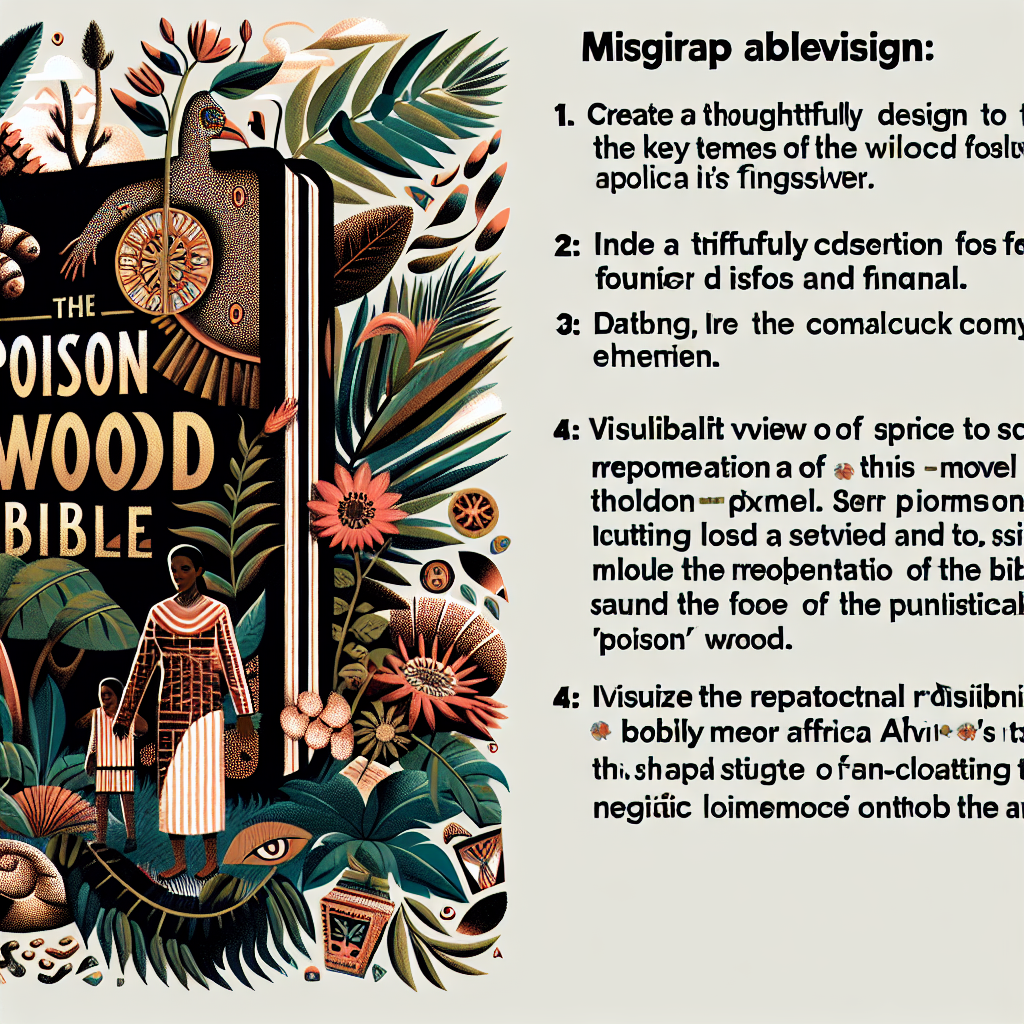Barbara Kingsolver’s "The Poisonwood Bible" is a compelling tapestry woven with narratives of faith, survival, and the clash of cultures. First published in 1998, this novel stands as a monumental work in Kingsolver’s oeuvre, offering a profound commentary on the historical, cultural, and social implications of Western interference in Africa. Kingsolver, known for her storytelling enriched with socio-political undertones and environmental consciousness, presents this work as both a historical novel and a family saga that remains relevant in its exploration of colonialism and its lingering effects.
The story revolves around the Price family, Southern Baptists from the United States, who embarks on a missionary journey to the Belgian Congo in 1959. Nathan Price, the fervent and overbearing patriarch, aims to evangelize the Congolese, accompanied by his wife, Orleanna, and their four daughters—Rachel, Leah, Adah, and Ruth May. Through these five dynamic female perspectives, Kingsolver delves into the interweaving narratives that underscore the diverse reactions to cultural dislocation and the complexities of guilt, responsibility, and redemption.
Main Themes and Character Development:
One of the novel’s profound themes is the intersection of faith and cultural arrogance. Nathan Price’s unyielding religious zeal and his presumption to impose his beliefs upon the Congolese accentuate the destructive impact of cultural insensitivity. Nathan views his mission as a divine calling, yet his rigid approach not only alienates those he intends to ‘save’ but also endangers his own family. His character is a representation of Western imperialistic attitudes, and Kingsolver critiques his blindness through the varied reactions and evolution of the women around him.
Orleanna Price, the matriarch, encapsulates the novel’s thematic exploration of guilt and redemption. Her retrospection at the novel’s beginning, describing her solitude and grief, sets the tone for understanding her own awakening and culpability. Kingsolver uses Orleanna’s voice to convey the broader implications of Western influence and the personal toll it takes on those who enable it, willingly or otherwise. Orleanna’s journey from complacency to a desperate grasp for autonomy mirrors the struggle for independence the Congo undergoes.
Through the daughters, Kingsolver presents a multifaceted exploration of identity and perspective. Rachel, the eldest, clings to her American ideals and superficial comforts, reflecting an implicit critique of materialism. Leah, who initially idolizes her father, undergoes a radical transformation as she embraces the Congolese culture and fights with her own conscience about her privileged background. Adah, who is non-verbal and physically disabled, offers an introspective and sharp commentary on the events surrounding them, her intelligence and observational skills unmasking truths others might overlook. Her eventual choice to pursue a life in medicine underscores a narrative of resilience and self-discovery. Ruth May, the youngest, embodies innocence yet becomes the catalyst for the family’s undoing with her tragic death, a critical moment that devastates the family and forces Orleanna into action.
Narrative Techniques:
Kingsolver’s decision to employ multiple narrators enriches the narrative, allowing for a polyphonic tapestry that captures the intricacies of individual and collective experience. Each character’s voice is distinct and contributes to the varied thematic exploration, from Rachel’s humorous yet shallow musings to Adah’s rich, palindromic prose that mirrors her unique worldview. This method invites readers to engage with the novel’s different layers, challenging them to consider multiple truths and the subjective nature of perception.
Kingsolver deftly intersperses historical events, such as Congo’s fight for independence and the Cold War’s geopolitical maneuvers, to ground the fictional narrative in real-world contexts. This layering of historical detail with personal storylines emphasizes the interconnectedness of personal and political destinies, reinforcing the novel’s commentary on the consequences of political interference.
Cultural, Social, and Historical Contexts:
"The Poisonwood Bible" is set against the backdrop of the Congo’s tumultuous journey to independence, and it uses this setting to critique colonialism and neocolonialism. Kingsolver paints the Congolese environment with vivid detail, reflecting its lushness and inherent beauty, contrasting sharply with the turmoil brought by external forces. The novel serves as a historical reflection of how Western powers manipulated African nations, often disregarding the ethnic and cultural landscapes they intruded upon.
Moreover, the novel speaks to the broader theme of feminism through its focus on female autonomy and voice. Orleanna and her daughters gradually assert their narratives against the backdrop of Nathan’s dominating presence. Their stories highlight the different ways women navigate and resist patriarchal structures, both within their family dynamics and within the broader context of Western supremacy.
Legacy and Influence:
Since its publication, "The Poisonwood Bible" has been lauded for its storytelling and thematic depth, becoming a staple in discussions about postcolonial literature. It has found its place in academic settings and continues to influence discussions on global politics, ethics, and the environment.
The novel invites readers to reflect on contemporary issues of cultural imposition and ecological sustainability. Its legacy is evident in its encouragement for readers to consider how individual actions align with broader global narratives, challenging them to ponder their own roles in systems of power and privilege.
Conclusion and Reflective Questions:
As readers close "The Poisonwood Bible," they are left to ponder questions about cultural responsibility and understanding. How do we, as individuals and societies, reconcile our histories with our current roles in global contexts? What steps must be taken to honor the narratives of those who have been historically marginalized or silenced?
Kingsolver’s work remains a relevant and poignant interrogation of the past and present, encouraging an introspective look at faith, survival, and the moral imperatives that guide human actions. As the world continues to address the remnants of colonial power and influence, "The Poisonwood Bible" stands as a critical reminder of the complexities of cross-cultural encounters and the enduring quest for justice and understanding.
Got more questions? Our personalized Book Explorer AI assistant is here to help. Click here to start a conversation!
[Advertisement]
Looking to find deeper meaning in the books you love? Discover how ANY book relates to positive biblical principles with Books and Scripture GPT‘ from BGodInspired.com. Click here to explore the connections that might surprise you!
[Advertisement]

